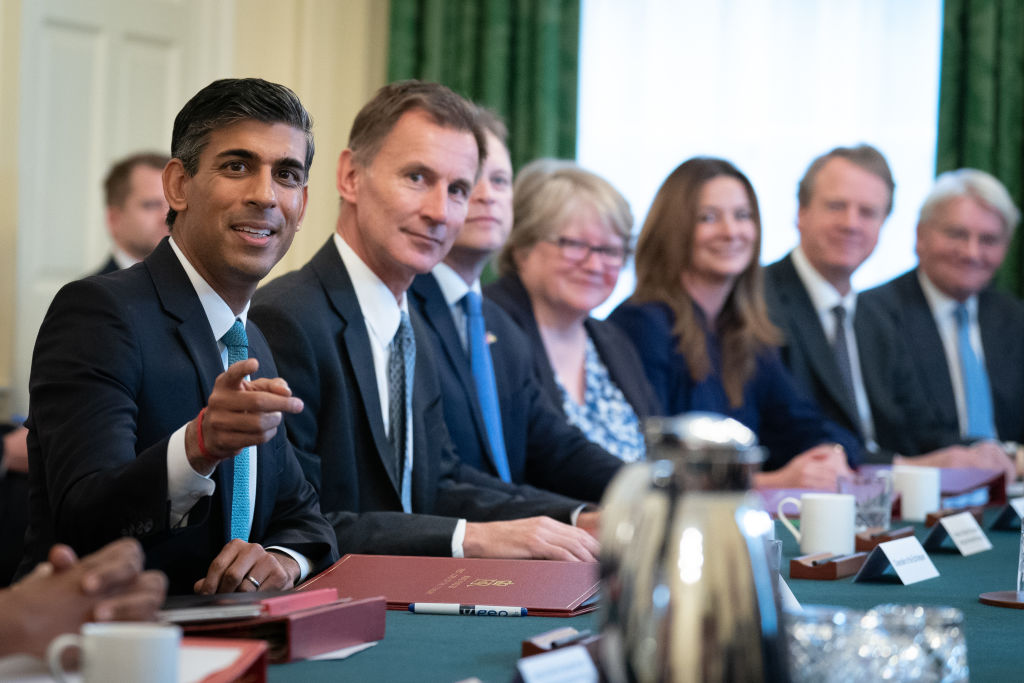Open arms? Sunak’s cabinet is a white flag as he fights for the party’s survival

It is easy to be confused by the blizzard of returns and departures that comprised the Rishi Sunak reshuffle. Luckily, I have recently rewatched Godfather 2, so understand how the new Cabinet can, at the same time, be both a prequel and a sequel to Liz Truss’ short-lived team. And much like Don Corleone, the new prime minister hopes to make his party an offer they can’t refuse.
Liz Truss and Kwasi Kwarteng had a clear pitch to their colleagues: we will restore the Tories fortunes by kickstarting economic growth. Within the party that boiled down to her effectively telling her colleagues they would have to see cherished pet projects delayed or abandoned, but in return they would get a package of tax cuts bigger than anything even Margaret Thatcher delivered.
This gambit failed, abysmally. It turned out lots of Tories actually care about issues other than tax cuts, and in any case, the markets forced Truss to reverse many of the giveaway. So, it makes sense that her successor has staked his premiership on a diametrically opposed approach; promising all wings of the party that they can pursue their favourite plans as long as they also agree to a painful bout of fiscal tightening.
Whereas both Boris Johnson and Liz Truss appointed a government from one wing of the party, Sunak has appointed a remarkably diverse team. The party’s hard right can be reassured by the return of last week’s Home Secretary. Suella Braverman is back now there is less interest in increasing immigration in order to massage growth forecasts. Indeed, at his first Prime Minister’s Questions, Sunak repeatedly accused Labour of being soft on crime and wanting “uncontrolled immigration”. Likewise, Sunak has surely signalled an intention to resume fighting the culture war by giving Kemi Badenoch the Women and Equalities brief. It will be a platform for her to continue the broadsides against social justice activism and advocacy that won her Tory plaudits during the summer. Meanwhile Dominic Raab is back at the Ministry of Justice, where he will no doubt restart his scheme to create a British Bill of Rights that limits the influence of the European Court of Human Rights.
But it’s not just the anti-woke right that is being indulged. Michael Gove is back as Levelling Up Secretary, where he can continue his work to support disadvantaged communities in small towns and coastal areas. Andrew Mitchell has returned to minister for international aid, a move which should signal a revitalisation of the government’s work in this area despite ongoing funding cuts. And despite his rumoured opposition to the green agenda in the run up to Cop26, Rishi Sunak has frequently talked about his commitment to achieving net zero this past week. This will please the many Tory MPs who care about climate change. Meanwhile, his return to the government’s manifesto pledge to ban fracking is a flirtation with the numerous Nimbys in his parliamentary party. As is his continued scepticism for onshore wind and building on the greenbelt.
The reason the new prime minister can make such a blitz of commitments to his party is that he does not have an ideological project to which all other considerations must be subordinated to. Instead, he has a much more immediate task. If he and his Chancellor cannot introduce the painful measures to reduce borrowing, restore market confidence, and stop exacerbating the problem of inflation then his premiership will be broken almost as quickly as Liz Truss’. Whereas she told her party that they can do nothing but enjoy her tax cuts, he is promising them that they can do anything as long as they endure his tax rises and spending cuts.
His new cabinet is designed to welcome all folds of the party back together – bar, perhaps, Jacob Rees-Mogg. If he’s not careful, it could quickly dissolve into the have-your-cake-and-eat-it approach Boris Johnson frequently turned to. Worse, it could become host to the ideological trench warfare that plagued Theresa May’s premiership. These many Tory factions may have put down arms for the moment, but peace rarely lasts long.
